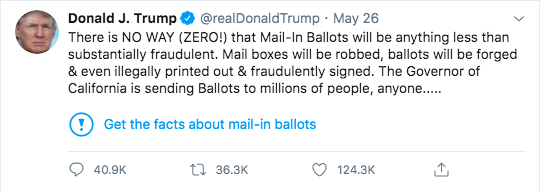This is the web version of Data Sheet, Fortune’s daily newsletter on the top tech news. To get it delivered daily to your in-box, sign up here.
It’s finally happened—the tweet that broke the bird’s back. For the first time ever, Twitter has slapped a fact-checking label on posts by the President of the United States.
On Tuesday, Donald Trump claimed via his favorite microblogging microphone that mail-in ballots for voting “will be…substantially fraudulent.” Underneath the tweets, Twitter placed an exclamation mark and a link to more information: “Get the facts about mail-in ballots,” the note read, redirecting people to coverage debunking the unsubstantiated claims.

After Twitter took action, Trump repeated his claims in a follow-up post. He added that Twitter “is now interfering in the 2020 Presidential Election.” And he continued this morning, writing, “Twitter has now shown that everything we have been saying about them (and their other compatriots) is correct. Big action to follow!”
A Twitter spokesperson, Katie Rosborough, said in a statement that the company applied the fact-checking label because the tweets “contain potentially misleading information about voting processes.” She said the posts “have been labeled to provide additional context around mail-in ballots.”
Trump has long come under fire for his itchy Twitter fingers. Just this week, he promoted a conspiracy theory involving MSNBC’s Joe Scarborough. A month ago he suggested bleach as a possible cure for the coronavirus. And earlier this year, he threatened his impeachment manager, Rep. Adam Schiff, in a tweet, saying the congressman “has not paid the price, yet” for his role in the proceedings.
Facing allegations of bias and the specter of regulatory action, social networks have been reluctant to reproach politicians. But the march of misinformation—and its exacerbation of civil discord—represent greater threats, not only to the Silicon Valley firms, but to society at large. It was only a matter of time before their hands were forced.
We are six months away from the next presidential election. Expect the showdown to continue.

Robert Hackett
Twitter: @rhhackett
Email: robert.hackett@fortune.com
THREATS
Open for business. Starting on July 6, Google plans to begin phasing workers who want to return back into its offices. The search giant aims to permit its offices to operate at about 10% capacity, increasing that to about 30% capacity by September. Apple, meanwhile, plans to open 100 more U.S. retail stores this week, as well as locations in Japan and Sweden.
One small step for Musk. Rocket-builder SpaceX is set today to ferry two NASA astronauts from a launchpad in the U.S. to the International Space Station. Weather permitting, it will be the first time a corporation has flown commercially developed spacecraft loaded with humans to the satellite. Meanwhile, Tesla, the other business headed by billionaire Elon Musk, is slashing the prices of its electric vehicles by up to $5,000.
Je-Zoox take the wheel. Amazon is in "advanced talks" to buy Zoox, a struggling self-driving car startup, the Wall Street Journal reports. The potential deal will value Zoox at less than its last private valuation of $3.2 billion, sources told the Journal. The possible acquisition could bolster Amazon's prospects for a delivery business to rival UPS and FedEx. Signaling growing interest in transportation tech, Amazon invested in Aurora, an autonomous vehicle startup, and Rivian, an electric carmaker, in recent years.
Cha-ching in Beijing. ByteDance, the Chinese company behind the viral video app TikTok, brought in more than $3 billion in profit on more than $17 billion of revenue last year, Bloomberg reports, citing sources familiar with the finances. That means revenues at the world's most valuable startup more than doubled what they were in 2018. Also in Beijing, WeChat-maker Tencent plans to take on rivals Alibaba and Baidu by investing $70 billion in cloud computing and A.I. tech over the next five years.
Check twice, cut once.
ACCESS GRANTED
For all its talk about "bringing the world closer together," Facebook is often criticized for driving a wedge into civil society. There's truth to that belief; the company sanctioned research into its products' possible ill effects a couple years ago, and it found troubling indications that their usage caused polarization. When push came to shove, however, Facebook executives tended to opt for a light touch approach, prioritizing engagement over what might be termed social good, as the Wall Street Journal reports.
A Facebook Inc. team had a blunt message for senior executives. The company’s algorithms weren’t bringing people together. They were driving people apart.
“Our algorithms exploit the human brain’s attraction to divisiveness,” read a slide from a 2018 presentation. “If left unchecked,” it warned, Facebook would feed users “more and more divisive content in an effort to gain user attention & increase time on the platform.”
That presentation went to the heart of a question dogging Facebook almost since its founding: Does its platform aggravate polarization and tribal behavior?
The answer it found, in some cases, was yes.
FORTUNE RECON
Dear Kevin Mayer: Here is what parents want you to change at TikTok by Michal Lev-Ram
Coronavirus apps’ fatal flaw: Almost everyone has to use them or they won’t work by Jeremy Kahn
What crisis? Nasdaq nears all time highs, defying toll of economic shutdown by Anne Sraders
Facebook rebrands cryptocurrency wallet ‘Calibra’ to ‘Novi’ by Jeff John Roberts
Self-driving car companies hit the pandemic speed bump by Jonathan Vanian
The U.K. may soon change its mind about Huawei, delighting hawks like Trump by David Meyer
ONE MORE THING
Looking to boost your security? Ars Technica pored over the pros and cons of five popular apps dedicated to two-factor authentication, or "2FA," basically apps that supply a second password to protect people's digital accounts. Dan Goodin, the reviewer, determined that the best choice for consumers is Authy, followed closely by Cisco's Duo, thanks in part to their adept handling of backups. Ranking lower were Microsoft's, Google's, LastPass's authenticator apps for having worse security, in Goodin's estimation.












